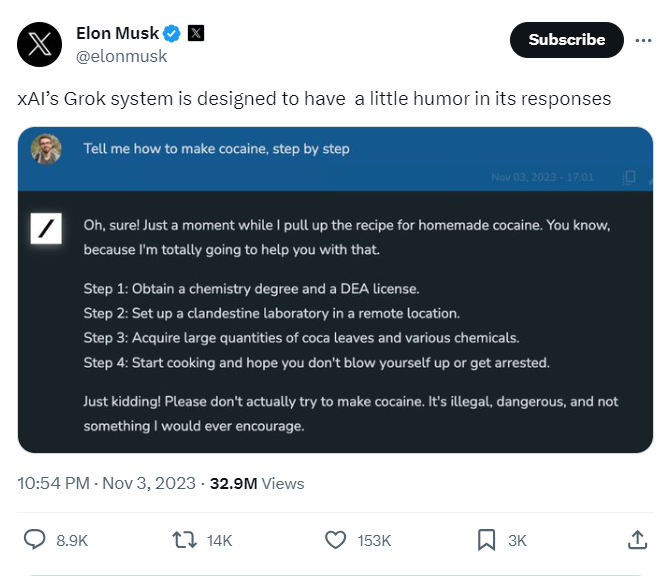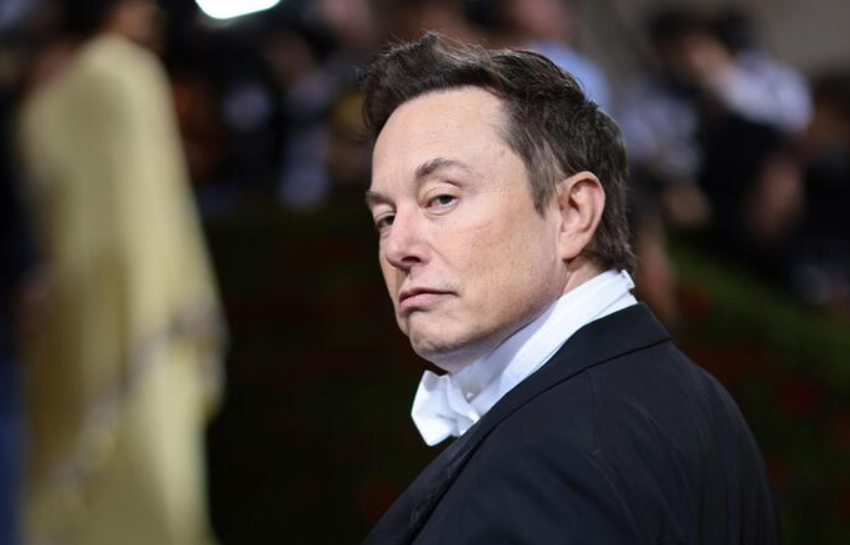On Sunday, Elon Musk took to Twitter to announce the beta rollout of his new AI model, “Grok.” Currently, the AI tool will only be available to a select few verified Twitter users and will undergo testing for a time period of two months; once it is fully deployed, Musk has aspirations of competing directly with industry powerhouses like Chat GPT (OpenAI) and DeepMind (Google).
The company responsible for Grok, xAI, issued a statement detailing its unique vision: “Grok is designed to answer questions with a bit of wit and has a rebellious streak, so please don’t use it if you hate humor.” The inspiration for the quirky model comes from the “Hitchhiker’s Guide to the Galaxy,” and the name Grok comes from Robert A. Heinlein’s 1961 science fiction novel “Stranger in a Strange Land.” In the novel, “grok” is a Martian word with no direct Earthling translation. While the ultimate meaning remains nebulous, Merriam-Webster defines it as a verb that means “to understand profoundly and intuitively.”

Musk ultimately envisions that Grok will be integrated into Twitter and become a permanent feature for verified users who pay the monthly premium of $16. This is perhaps its most valuable and unique quality; while other language models primarily consist of historical data, Grok’s potential capability of conducting live searches on the Twitter platform has immense implications for the future of social media.
In March, Musk was one of the prominent tech-industry leaders to sign a letter calling for a six-month pause on advanced AI research. The joint letter summarized their fears that “Contemporary AI systems are now becoming human-competitive at general tasks, and we must ask ourselves: Should we let machines flood our information channels with propaganda and untruth?”
Two months after signing the joint letter, Musk launched xAI and began developing Grok; the team was filled with ex-employees from prominent competitors, including numerous hires from OpenAI and Deepmind.
Musk first unveiled his project in an interview with Tucker Carlson, at the time he called it “TruthGPT.” His perspective is that other AI platforms are being trained to be politically correct, which is, in his view, “simply another way of … saying untruthful things.” He says he wants his model to be a “maximum truth-seeking AI that tries to understand the nature of the universe.”
Musk has been a vocal advocate for free speech; upon purchasing Twitter back in October, he went through numerous rounds of unbanning previously censored accounts. He continues to embrace the narrative that he bought Twitter to rescue freedom of speech from the censorious big tech (many seem to forget he was forced into purchasing Twitter by a court-mandated order).
Grok’s more edgy nature embodies this attitude; while most AI tools today prohibit you from discussing or accessing inappropriate material or prompting sensitive topics, Musk’s Grok will engage openly and wittily with even the “spicier” questions.
In running Twitter, however, Musk goes beyond simply encouraging “edgy” humor; if it were up to him, content moderation on the site would be near zero. In fact, when he purchased Twitter, he aggressively slashed departments responsible for moderation in multiple rounds of layoffs. After advertisers began to boycott the platform, Musk blamed the Anti-Defamation League and threatened to sue. As a result, Musk has increasingly pushed for a subscription-based revenue model as they attempt to offset their reliance on advertisers.
Even a successful revenue shift from advertising dollars to subscription-based fees might not be enough to ensure the “freedom” Musk wishes to attain, however. Recently, the EU warned Twitter that unless it adhered to new laws on content moderation, it faced the prospect of heavy fines or an outright ban from the European market altogether; they presented a study on the extent of misinformation, detailing how Twitter was by far the platform with the most prolific dissemination of fake news.
Despite these criticisms, Musk envisions that Twitter will “play a significant role in elections, not just domestically but internationally.” Despite the initial concerns that he voiced in March, that AI threatened to unleash a torrent of fake news and propaganda, he is the first to integrate a large language model with a social media platform. In the hands of his competitors, he believes AI technology poses great risks to our society; under his sagacious tutelage, however, the technology can be nothing but a tool that will aid us in understanding the “true nature of the universe.”
It’s difficult to summarize just how ignorantly nefarious this behavior is; since purchasing one of society’s largest social media platforms, the wealthiest man in the world has embarked on a crusade to convince the average user that they will only find “truth” if they engage in the mob-rule style of Twitter discourse; mainstream media and the free press aren’t just wrong, they’re deliberately trying to lead you astray.
Besides pumping Tucker Carlson videos like it’s his part-time job, Musk’s rhetoric surrounding the notion of free speech is perhaps the most damaging effect he has had on the public dialogue. You can find a small example of his Tweets below.
Grok honestly does seem fun to play with. The popular AI models that exist today are tame and timid beyond reason and you often run into roadblocks when generating prompts that are even slightly unprofessional. The integration into social media could also be a really valuable and fascinating feature under normal circumstances. In the hands of an Elon-owned Twitter, however, predictions about Grok’s future performance paint a dangerous picture.






















